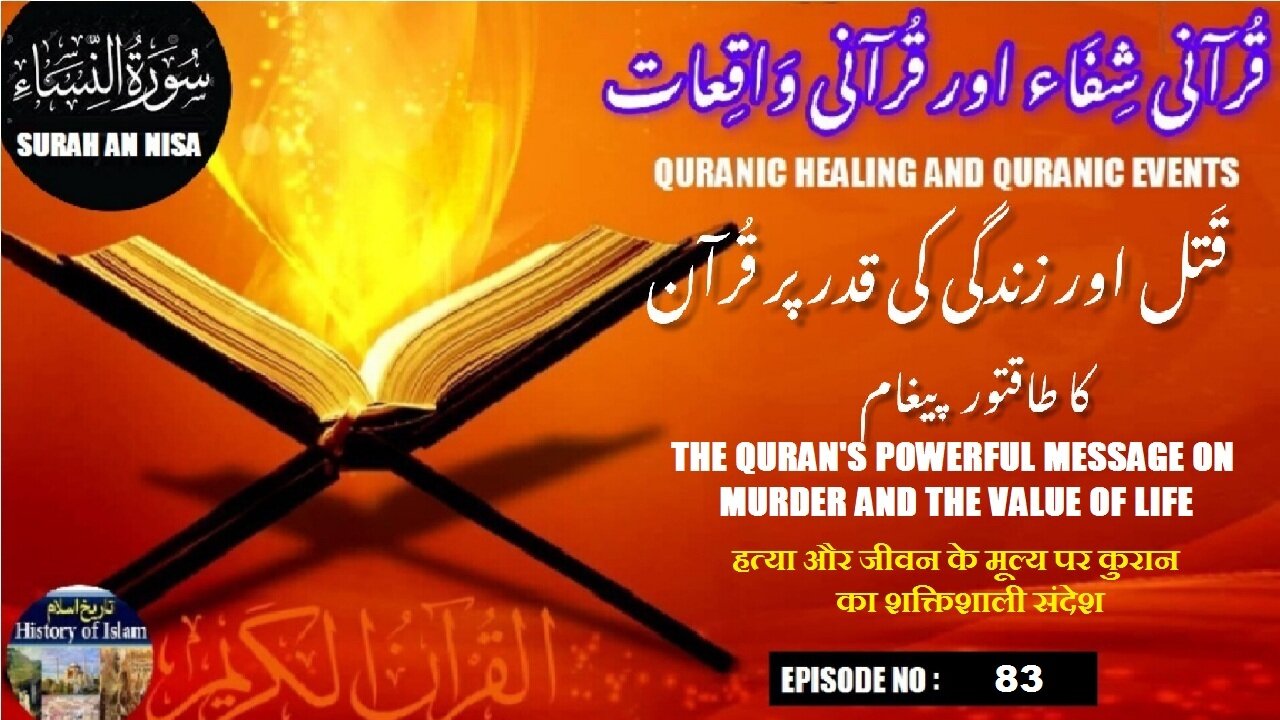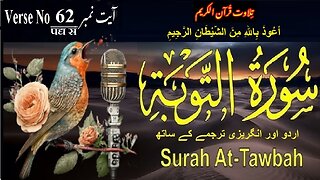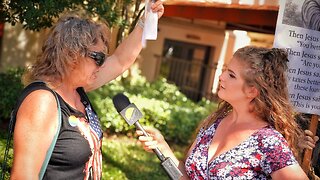Premium Only Content

Quran's powerful message on murder and the value of lifeقتل اور زندگی کی قدر پر قرآن کا طاقتور پیغام
@islamichistory813 #healing #and #events #from #the #quran #historical #stories #and #events #quranicstories #selfhealing #success #stories #striking #events #in #history #quranstories, #storiesfromthequran #religious #creation #stories #trending #quran #short #historical #loves #historical #heroes #what #is #true #strength #calm #quran #recitation #for #babies #islamic #healing
The Quran’s Powerful Message on Murder and the Value of Life | Surah Al-Ma’idah verse 32
Brothers, sisters, friends and elders Assalamu Alaikum, wa Rahmatullahi wa Barakatuhu, we are presenting the 83th episode of the Islamic informative video based on healing and events from the Holy Quran, and in this video we will describe,The Quran’s Powerful Message on Murder and the Value of Life | Surah Al-Ma’idah versen32
Verse 32 of Surah Al-Ma’idah delivers one of the most profound and universal teachings in the Quran about the sanctity of human life. This verse is often cited for its powerful statement that **“whoever kills a soul unless for a soul or for corruption \[done] in the land – it is as if he had slain mankind entirely.”** This comparison vividly underscores how precious each individual human life is in the eyes of Allah and the immense gravity of taking a life unjustly. The verse conveys a clear, unequivocal message that human life is sacred and must be protected under all circumstances except in very specific, justifiable cases such as legal retribution or severe corruption.
The background of this verse provides deep insight into the moral and ethical framework Islam sets for justice and the preservation of life. It comes in the context of the story of the two sons of Adam (Qabil and Habil), where the first murder in history was committed. The Quran uses this story not only to condemn the act of murder but to elevate the sanctity of life by equating the killing of one innocent soul to the killing of all humanity. This is not merely a poetic exaggeration but a profound theological and ethical principle that reflects the interconnectedness and value of human beings as a species.
The Quranic statement serves as a strong deterrent against violence and murder. It establishes that unjust killing is the gravest sin, and its impact is so immense that it affects the whole of humanity. By framing murder in this way, the Quran emphasizes the loss suffered is not isolated but ripples through the fabric of human society, shattering peace, security, and the moral order. It shows that the taking of a single life is an affront to the entire human community, highlighting how every person embodies a fragment of humanity’s collective dignity.
Importantly, the verse does allow for exceptions, recognizing the complex nature of justice. Killing “for a soul” refers to lawful retribution, such as capital punishment in cases of intentional murder, where the family of the victim may seek justice. Similarly, “for corruption in the land” pertains to severe crimes that disrupt social order, such as terrorism or treason. These exceptions are framed within a strict legal and ethical system that demands due process and justice, ensuring that the taking of life is never arbitrary or unjustified. The Quran’s approach balances the sanctity of life with the need to maintain justice and protect society from grave harm.
This verse also teaches about the value of forgiveness and mercy. While the severity of unjust killing is stressed, the broader Quranic ethos encourages compassion, reconciliation, and forgiveness wherever possible. The emphasis on the sanctity of life calls on individuals and communities to seek peaceful solutions and uphold human dignity, promoting a culture where life is cherished, and violence is a last resort.
The teaching in verse 32 of Surah Al-Ma’idah has far-reaching implications for many contemporary issues, including debates on capital punishment, war, terrorism, and human rights. It provides a divine benchmark against which all actions involving life and death should be measured. In modern contexts, this verse reminds societies of the absolute need to protect innocent lives, to act with justice, and to condemn all forms of unjust violence and oppression. It also challenges individuals to recognize the weight of their actions, understanding that harming another person unjustly damages the whole of humanity.
Beyond its legal and social dimensions, the verse offers a spiritual and philosophical reflection on the value of life. It affirms that every human being is a unique creation of Allah, honored and dignified. The soul represents more than just biological life—it is a trust from Allah, a sacred trust that demands respect and care. The taking of a soul unjustly is a violation of this sacred trust, a crime against the divine order and the human family alike.
Furthermore, the Quran’s framing of murder in this universal way encourages empathy and solidarity among people. It highlights the shared humanity that binds all people, regardless of race, religion, nationality, or background. By equating the killing of one person with killing all people, it calls for an ethic of universal compassion and justice, urging people to see each other as part of a single human family deserving of dignity and protection.
In conclusion, verse 32 of Surah Al-Ma’idah stands as a timeless and powerful statement on the sanctity of human life. It asserts that every life is invaluable, and unjust killing is a crime of the highest order, equating the loss of one innocent soul with the loss of all humanity. While allowing for just exceptions within a strict ethical framework, it ultimately calls humanity to uphold justice, mercy, and respect for life. This teaching resonates beyond its immediate historical context, providing a foundational principle for human rights, ethics, and the pursuit of peace in a world too often marred by violence and injustice. It challenges us to recognize the sacred trust of life and to commit ourselves to protecting and honoring it in every possible way.
With this, we ask for your permission until tomorrow and pray to Allah Almighty to grant us the ability to act on the Quran and Hadith, Amen
Allah Hafiz
===========================
-
 1:17
1:17
ISLAMIC HISTORY
15 hours agoSurah At Taubah Verse No 62 تلاوت َسورة اَلتَّوْبَة اردو اور انگریزی ترجمے کے ساتھ آیت نمبر
1 -
 LIVE
LIVE
Nerdrotic
3 hours agoHollywood's Long Dark Summer of the Soul - Nerdrotic Nooner 511
13,943 watching -
 10:47
10:47
Nikko Ortiz
1 hour agoPainful 19
524 -
 12:06
12:06
Liberty Hangout
1 day agoDemocrat Woman Can't Define 'Woman'
13.3K36 -
 LIVE
LIVE
GritsGG
3 hours agoRumble Customs! 3515 Ws! 🫡!
643 watching -
 LIVE
LIVE
Grant Stinchfield
1 hour agoHow Local TV News LOST Its Soul
122 watching -
 LIVE
LIVE
Badlands Media
11 hours agoBadlands Daily: September 1, 2025
3,731 watching -
 1:12:35
1:12:35
theoriginalmarkz
2 hours agoCoffee with MarkZ. 09/01/2025
22.6K7 -
 2:59:48
2:59:48
Wendy Bell Radio
7 hours agoSunday, Bloody Sunday
96.8K213 -
 DVR
DVR
crgoodw1n
1 hour agoHAPPY LABOR DAY! Tactical shoosting W/ @BenderOdoyle Ask about !12hr !freshenup !discord
642